How I earned a knowledge panel without a Wikipedia page
Learn the specific steps I took to earn my knowledge panel entry and get established in Google’s Knowledge Graph.
Knowledge panels are one of the most coveted, yet mysterious elements in organic search.
Brands desire to have their own robust Knowledge Panel entry, but are left with little to no control over what appears in them.
By this point, we should all have a basic understanding of entities within Google’s Knowledge Graph. Consider that required reading for this article.
Where does Google pull entity data from?
We all know that Google pulls information from their Knowledge Graph for knowledge panels, but where do they pull information for the Knowledge Graph?
Technically, Google can use information from any crawlable website for their Knowledge Graph. However, we most often see Wikipedia as the dominant source of information.
The types of websites Google likes to pull from are typically directory-style websites that provide information that is:
- Accurate.
- Structured.
- Consistent.
Jason Barnard’s Kalicube has an awesome resource that tracks entity sources for the past 30 days. I referred to this list and many of his articles for guidance on building my knowledge panel and personal entity.
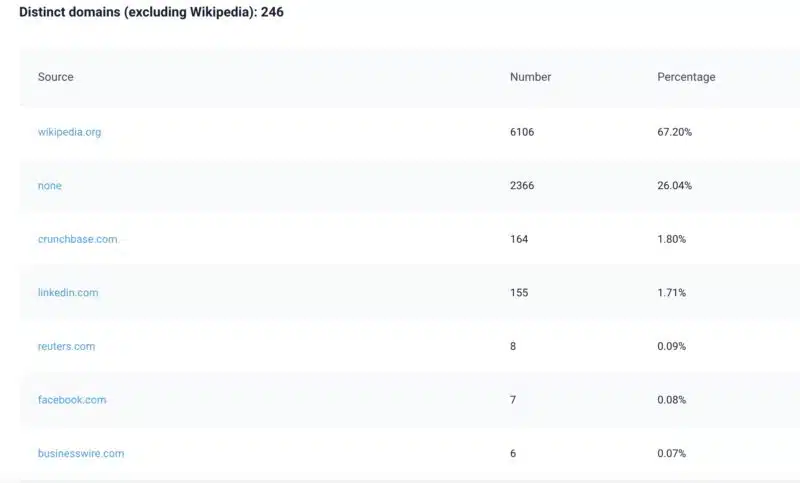
Why is Wikipedia so prolific?
Google tends to use Wikipedia so heavily for a few reasons:
- It’s heavily moderated and difficult to get an entry approved.
- The content is well structured and easy for search engines to understand.
- It’s a highly trusted resource.
While Wikipedia has skeptics reminding us that anyone can edit an entry, a heavy amount of moderation and editing still takes place on Wikipedia. Given that it’s also a fairly neutral/unbiased source of information, that gives Google all the more reason to trust it.
So if it’s so difficult to get an entry, why do so many SEOs only focus on getting a Wikipedia page as their way into the Knowledge Graph?
Well, the answer is that once you have a Wikipedia page, it’s almost a guaranteed entry. However, this is a mindset we need to break, because by now, we should all know that there are no guarantees in SEO.
Sure you can definitely pursue a Wikipedia page for your own brand, but just make sure to diversify your tactics and don’t just focus on that as your sole strategy.
How long does it take to earn a Knowledge Graph entry?
Don’t say it depends, don’t say it, don’t say it. Okay, so it is different for everyone. For me, it took about a year since the beginning of my efforts for mine to appear.
It all depends on how hard your brand is working and whether or not your brand deserves one.
Did I try that hard? Not really.
Did I deserve one? Not at all.
But based on the specific steps I took to market myself in the industry, I just so happened to earn a Knowledge Panel in the process.
I never thought I’d actually get one, but decided to run a series of tests to see if it would actually work, and to my surprise it did.
The specific steps I took to earn my knowledge panel
Okay now that you’ve probably scrolled past all of my intro content, let’s get to what you came here for. What specifically did I do to earn my Knowledge Panel entry and get established in Google’s Knowledge Graph?
Here are the specific steps I took in order.
1. Established entity home
The first step is to establish your root or home of your entity. This could be your personal website, brand’s page, author page, or anything that is the truest source of information for the entity. For me, I chose my personal website’s homepage for my entity home.
On my homepage, I did two specific things to help search engines:
Created ‘About Me’ Content
I created a one-sentence “about me” that I planned to use on all bio information across the web. Almost all of my personal bios on different websites I’m featured on start with this sentence. This creates consistency on who I am and what I do.
Create bulleted list of work
Having a short, easy to crawl, list of what I do helps create a connection to myself and other entities. My hope was Google would understand that I could be found on those other websites and better understand the relationship between myself and those entities. More on this in the schema section.
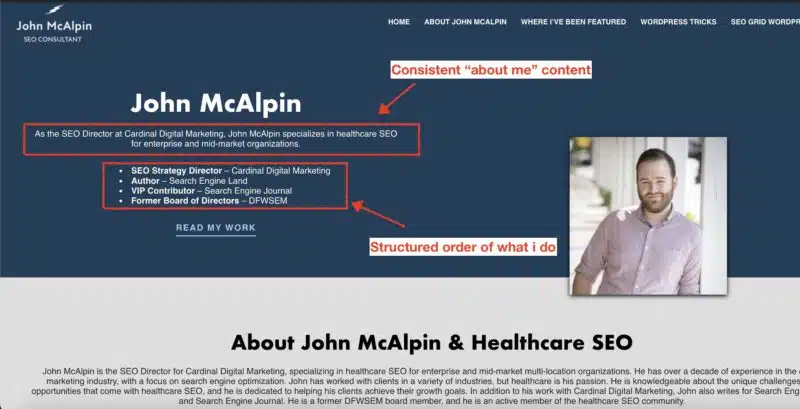
2. Industry authorship
For the past four years, I’ve been featured on dozens of podcasts and written plenty of articles for Search Engine Land, Search Engine Journal, OnCrawl, and many mory!
All of my features come with an author page, which has a list of all my articles for that site as well as Person schema for that site.
Additionally, all of my author pages contain a link back to my entity home, which is critically important for building your brand’s entity relevancy.
3. Consistent schema
Schema markup is the connective tissue that brings all of my authorship together. On my entity home, I ensured that I have robust schema markup.
The most important thing to include in the schema markup is the SameAs data which I directed to all of my most important features on the web. I ensured to add SameAs links to any sources that I’ve seen generate entities in the past.
Below is a screenshot of what you’ll see if you run my personal website through the Schema Markup validator.
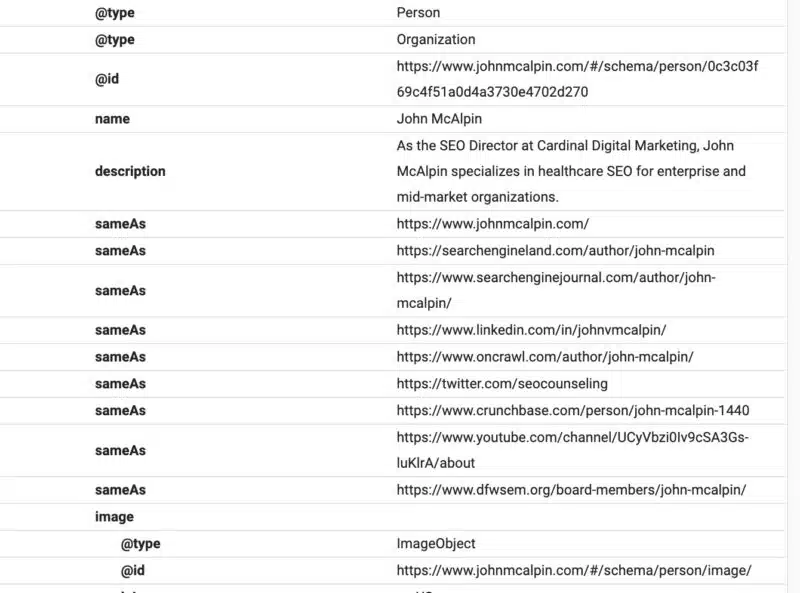
The specific schema type I chose was Person, as this was most accurate to myself. If you’re creating an entity for your business or brand, try to choose the schema type that’s most accurate to your business.
Typically, I create schema from scratch for all of my clients. However, Yoast’s author/person schema provided exactly what I was looking for and included one important feature.
What Yoast did for me was instead of making a generic Organization schema type for my website, I marked my website as a Person.
Within the specific settings, I pasted all of my important links into the contact info fields. Please note that other than Twitter, you can paste any link in those fields.
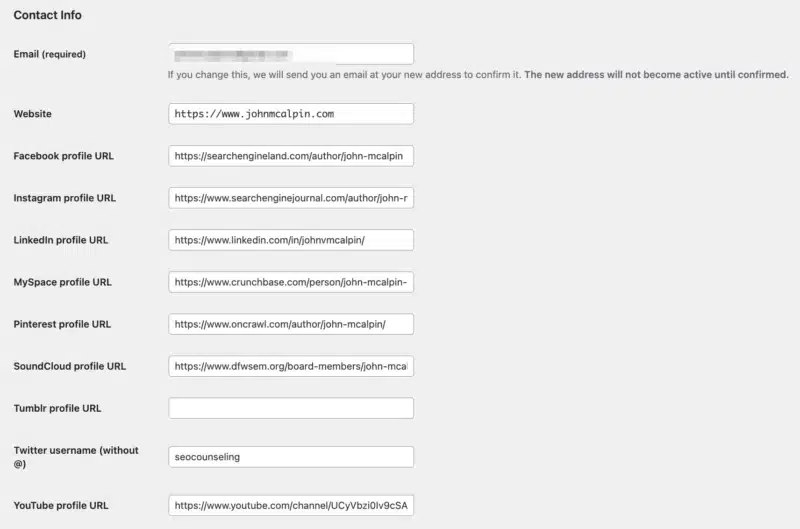
4. Consistent linking
Schema plays a huge factor in creating an interconnected web of consistent information for Google’s Knowledge Graph. However, external links provide even greater trust signals.
On my website, I have a collections page that links out to all of my important work. It’s like a mini CV of my work for anyone who wants to work with me.
However, you can’t just link out to other places on your website, you need established entities linking back to you.
That’s why all of my featured podcasts and author pages have a link back to my website. Not only are they linking back to my website, they’re all linking to my homepage, which I’ve established as my entity home.
5. Directories
This can definitely help get an easy foot in the door for many people and brands trying to get established with their own knowledge panel. One of the biggest directories that I recommend getting established in is Crunchbase.
In fact, Crunchbase is what was listed as the source data during the first iteration of my knowledge panel.
I’ve seen many startups get their first knowledge panel entry through Crunchbase and it seems to be a consistently high source for Google to rely on. This is because Crunchbase has some verification processes that make it slightly more challenging to create spam in bulk.
When getting started with building out your directories, focus on the niche ones that are most relevant to your industry. This will go a lot farther for you than Crunchbase or any other big ones.
The different iterations my knowledge panel has shown
Over the course of about 1-2 months, Google has used a variety of different sources to feed my knowledge panel. It’s been very interesting to see how it’s evolved over such a short amount of time. I’ve even had my own article carousel which has since disappeared.
First iteration: All crunch, no flavor
At first, Crunchbase was the source of my entire knowledge panel entry. Something I found amusing is that there’s no link for my LinkedIn page, it’s just the anchor text on Crunchbase.
This was a great win for me and I was pleased with how structured the knowledge panel was.
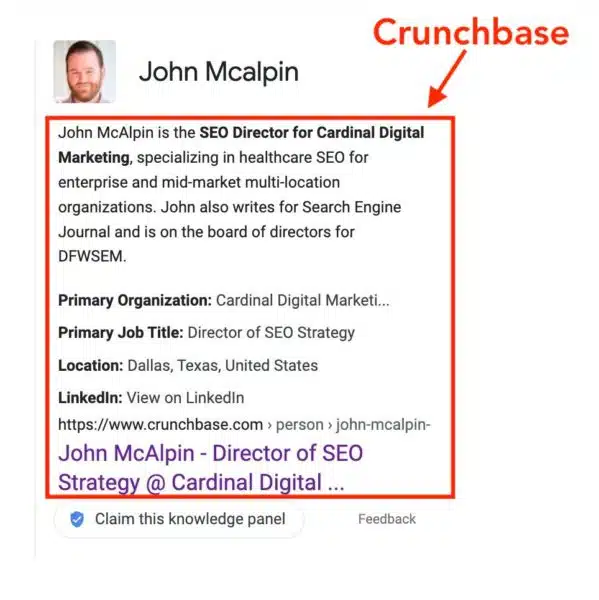
I tested a few queries to see how my entity data would appear as a zero-click result.
Testing searches: “Who is John McAlpin?”
This result was a little disappointing as it brought up a different John McAlpin who was referenced in a press release. However, I did see my entity in a side panel, which was both surprising and exciting.

Testing searches: “Where Does John McAlpin Work?”
This was a much more accurate result, but also a surprising one. If Crunchbase was fueling most of my knowledge panel data, why was Google showing Search Engine Journal as the source for this featured snippet?
We could speculate all day on our theories of how Google came to this decision, but I was just glad to see a more accurate result here.

Second iteration: Images getting comical
A few weeks after the first sighting of my Knowledge Panel, I see a few interesting updates:
- My image changed to a caricature that I used on one of my OnCrawl articles.
- The “about” content changed to my author bio from Search Engine Journal
- Summary data remained from Crunchbase
- Source data label changed to my Search Engine Journal author page.

Third iteration: Image correction
Unhappy with my image being a cartoon for my professional headshot, I submitted feedback to update the image. I chose my image from Search Engine Land and sure enough it updated it about two weeks later.
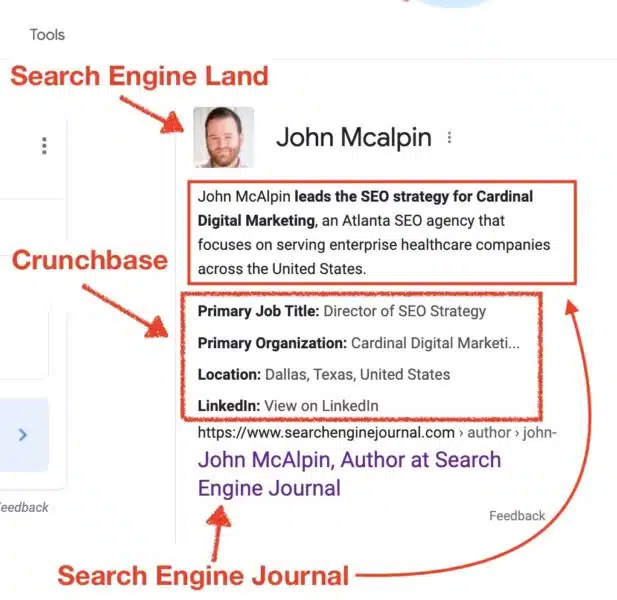
Key takeaways
When seeking to earn your own knowledge panel, it’s important to keep in mind a few things.
- It may not happen at all. You have no control over what Google displays in its results. All you can do is try to send the right signals consistently and hope that it pays off.
- If it does happen, it will take time. It took me longer than a year for my knowledge panel to show up. Large organizations that have aggressive PR firms have a higher chance of showing up sooner, but even that isn’t a guarantee.
- Consistency is key. Once you establish the signals you want to send, be consistent in that. As you could see in my second iteration, I wasn’t consistent in my choice of imagery and that messed up how I wanted my knowledge panel to appear.
- Have patience. Just like all other factors in SEO, it takes time.
Contributing authors are invited to create content for Search Engine Land and are chosen for their expertise and contribution to the search community. Our contributors work under the oversight of the editorial staff and contributions are checked for quality and relevance to our readers. The opinions they express are their own.
Related stories